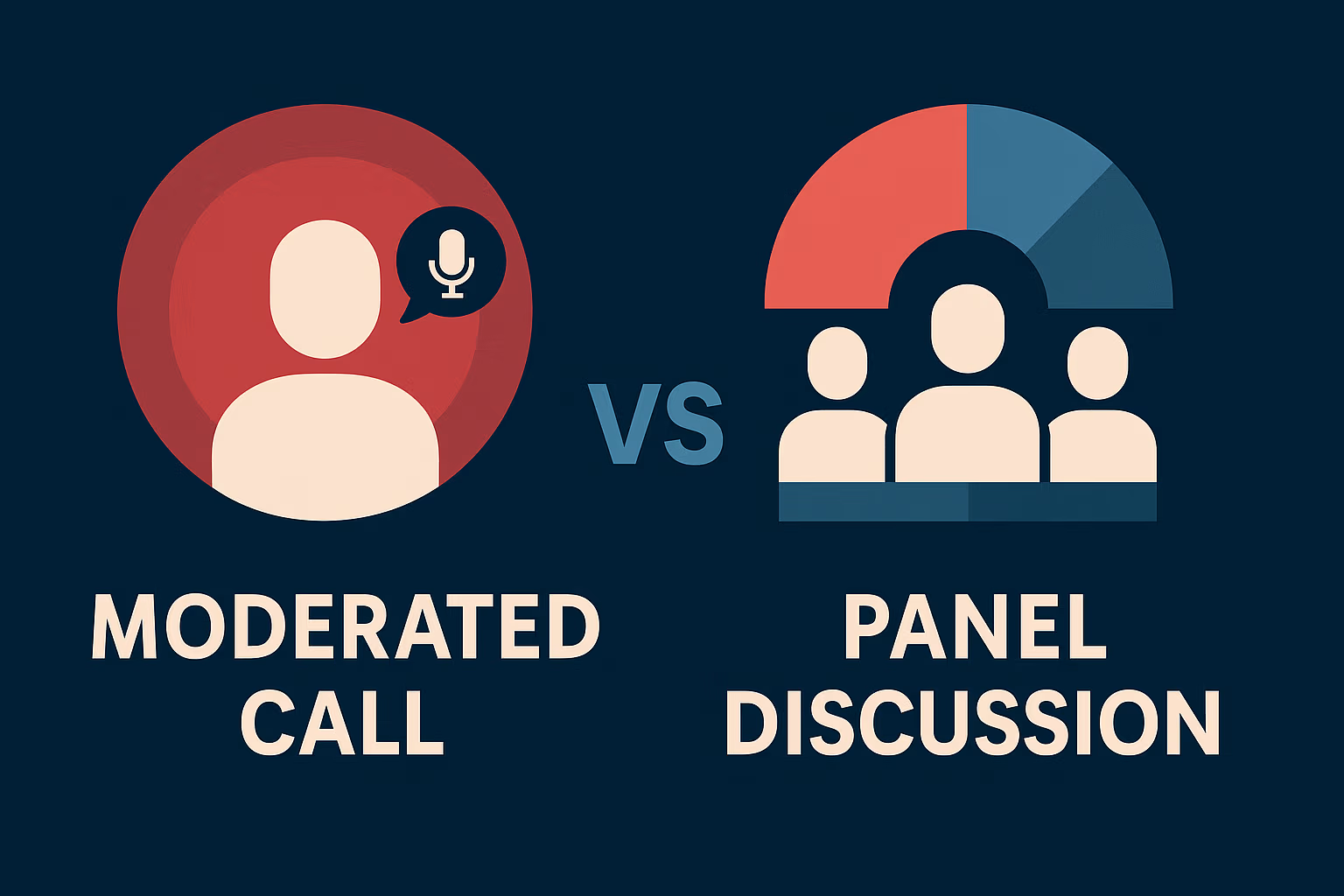Comparing Moderated Calls with Panel Discussions: Key Differences

Introduction:
When it comes to gathering expert insight, organizations today have access to more research formats than ever. Among the most widely used are moderated calls and panel discussions two qualitative methods often used interchangeably, yet fundamentally different in structure, purpose, and outcomes.
Choosing between them isn't simply a matter of preference. The format you select should align with your research objective, decision timeline, and depth of insight required.
At Nextyn, we support both formats across a variety of use cases from early market exploration to strategic deep dives. This article outlines the key differences between moderated calls vs panels, and when one may be more effective than the other.
Understanding the Two Formats
Let’s begin with a simple distinction.
- Moderated Calls are one-on-one expert interviews led by a trained moderator. They allow for focused, in-depth exploration of a topic with a single subject matter expert.
- Panel Discussions involve multiple experts in a group setting, often guided by a moderator. These discussions are designed to encourage dynamic interaction, multiple perspectives, and debate.
While both are forms of expert discussions, the experience and the output is quite different.
Key Differences: A Closer Look
1. Depth vs Breadth
Moderated Calls are ideal when you need depth. They allow you to:
- Explore a topic in detail
- Ask follow-up questions based on the expert’s unique experience
- Validate assumptions in a controlled setting
This makes them well-suited for projects that require clarity on operational nuances, decision-making frameworks, or firsthand experience.
Panel Discussions, on the other hand, offer breadth. With multiple experts in the room, you gain access to diverse view points, which is particularly useful when:
- Assessing consensus across a market
- Comparing different industry segments or regions
- Exploring strategic themes that benefit from debate
Use case example: If you're validating how logistics trends are evolving across Southeast Asia, a panel may provide richer context than a single voice.
2. Control and Customization
One of the advantages of moderated calls is control. You can tailor each conversation to your needs adjusting the interview flow based on the expert’s background, skipping irrelevant areas, and going deeper where needed.
With panel discussions, there is less control. The moderator must balance time among participants, ensure equal engagement, and steer the group while allowing for organic dialogue.
While panels offer real-time comparison, they often sacrifice the ability to explore any single expert’s experience in full detail.
3. Interpersonal Dynamics
In one-on-one calls, the expert often feels more at ease, leading to candid, reflective answers. Moderators can build rapport, probe sensitively, and explore complex or even confidential topics more comfortably.
Panel discussions, by contrast, are shaped by group dynamics. Some experts may dominate; others may hold back. The presence of peers can either encourage openness or cause participants to be guarded particularly in competitive or high-stakes industries.
This is an important consideration when choosing your format. In sensitive projects, moderated calls usually yield higher-quality responses.
4. Time and Efficiency
If you’re running a fast-paced project and need focused insight, moderated calls are more efficient. They can be scheduled quickly and don’t require coordination between multiple participants.
Panels, on the other hand, take more effort to organize but can be useful when time with experts is limited. Instead of running five separate calls, you might gain valuable input from five experts in a single 60-minute session.
That said, panels require skilled moderation and post-call synthesis to ensure insights aren’t lost in the back-and-forth.
5. Output and Usefulness
A moderated call typically results in a clear, structured transcript or notes. Since the conversation is focused, it’s easier to map insights directly to your research framework.
Panel discussions generate more complex outputs. The discussion may touch on multiple themes with overlapping viewpoints. While the insight can be richer in context, it often takes more time to distill and apply to specific decision-making needs.
At Nextyn, we help clients navigate both outcomes. Through tools like Transcript IQ, we ensure each format delivers usable, searchable intelligence regardless of how complex the discussion gets.
When to Use Which: Practical Guidelines
Choose Moderated Calls When...
You need to go deep on a topic
The subject is sensitive or confidential
Your internal team needs structured insight
Time is limited and focused insight is key
Choose Panel Discussions When...
You want multiple perspectives in one session
The topic is broad or market-wide
You’re testing hypotheses or gauging market consensus
You’re exploring emerging trends across domains
The Role of the Moderator in Both Formats
In both research formats, the moderator plays a pivotal role. But the interview techniques required differ.
- In moderated calls, the moderator must be agile knowing when to probe, when to move on, and how to draw out specific examples without derailing the session.
- In panels, the moderator must balance participation, manage time, and navigate disagreements constructively ensuring the discussion remains productive and respectful.
At Nextyn, all expert sessions are professionally moderated. We tailor our moderation style to the format, audience, and decision context ensuring each session drives value.
.png)
Final Thoughts
Both moderated calls and panel discussions are valuable tools in the qualitative research tool kit. But like any tool, their value lies in choosing the right one for the job.
If your goal is depth, structure, and clear insight, moderated calls are likely your best bet. If you’re looking for diverse perspectives and market-level dialogue, panel discussions can offer a wider lens.
At Nextyn, we help our clients choose, design, and execute the right research formats for their strategic needs ensuring that expert time leads to actionable outcomes.
Whether you're building a new market thesis, validating a strategy, or exploring future trends, we can help structure the conversations that matter.






